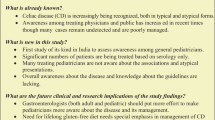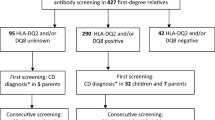Abstract
HLA molecular typing for celiac disease (CD) is a genetic test with a high negative predictive value. The aim of this study is to explore knowledge of and attitudes towards genetic testing (GT). A 25-item questionnaire was developed by a multidisciplinary team and distributed to members of CD support groups across the United States. Respondents (n = 1835) were mainly female (88 %), married (76 %), and college-educated (55 %), with a median age range of 31–50 years. Those who were married (82 vs 75 %, p = 0.002), had children (82 vs 74 %, p < 0.001), and had pursued education beyond high school (81 vs 68 %, p = 0.004) were more likely to be aware of the availability of GT. On multivariable analysis, adjusting for age, sex, education, marital status, region of residence, and having children, college-education (OR 2.05, 95 % CI: 1.33–3.16) and having children (OR 1.56, 95 % CI: 1.15–2.11) remained significant predictors of GT awareness. A majority of patients with a personal or family history of CD planned GT for their children, and the most common concerns regarding GT were cost and impact on health care and/or insurance. In conclusion, awareness of GT is high among CD support group members. Efforts should be made to increase knowledge of GT in those with a lower educational level, and healthcare professionals should attempt to address concerns regarding GT cost and the impact of results on health care and insurance status.




Similar content being viewed by others
References
Almeling, R., & Gadarian, S. K. (2014). Reacting to genetic risk: an experimental survey of life between health and disease. Journal of Health and Social Behavior, 55, 482–503.
Barbero, E. M., McNally, S. L., Donohue, M. C., & Kagnoff, M. F. (2014). Barriers impending serologic screening for celiac disease in clinically high-prevalence populations. BMC Gastroenterology, 14, 42.
Barker, J. M., & Liu, E. (2008). Celiac disease: pathophysiology, clinical manifestations, and associated autoimmune conditions. Advances in Pediatrics, 55, 349–365.
Blanchette, P. S., Spreafico, A., Miller, F. A., Chan, K., Bytautas, J., Kang, S., et al. (2014). Genomic testing in cancer: patient knowledge, attitudes, and expectations. Cancer, 19, 3066–3073.
Catassi, C., & Fasano, A. (2014). The debate on coeliac disease screening—are we there yet? Nature Reviews. Gastroenterology and Hepatology, 11, 457–458.
Catassi, C., Kryszak, D., Bhatti, B., Sturgeon, C., Helzlsouer, K., Clipp, S. L., et al. (2010). Natural history of celiac disease autoimmunity in a USA cohort followed since 1974. Annals of Medicine, 42, 530–538.
Collin, P., Huhtala, H., Virta, L., Kekkonen, L., & Reunala, T. (2007). Diagnosis of celiac disease in clinical practice: physician’s alertness to the condition essential. Journal of Clinical Gastroenterology, 41, 152–156.
Freedman, B. I., Fletcher, A. J., Sanghani, V. R., Spainhour, M., Graham, A. W., Russell, G. B., et al. (2013). Perceptions regarding genetic testing in populations at risk for nephropathy. American Journal of Nephrology, 38, 453–457.
Green, P. H., & Cellier, C. (2007). Celiac disease. New England Journal of Medicine, 357, 1731–1743.
Green, P. H., & Jabri, B. (2003). Coeliac disease. Lancet, 362, 383–391.
Gupte, M., Alcalay, R. N., Mejia-Santana, H., Raymond, D., Saunders-Pullman, R., Roos, E., et al. (2015). Interest in genetic testing in Ashkenazi jewish parkinson’s disease patients and their unaffected relatives. Journal of Genetic Counseling, 24(2), 238–246.
Hudson, K. L., Holohan, M. K., & Collins, F. S. (2008). Keeping pace with the times—the genetic information nondiscrimination act of 2008. New England Journal of Medicine, 358, 2661–2663.
Husby, S., Koletzko, S., Korponay-Szabó, I. R., Mearin, M. L., Phillips, A., Shamir, R., et al. (2012). European Society for Pediatric Gastroenterology, Hepatology, and Nutrition Guidelines for the Diagnosis of Coeliac Disease. Journal of Pediatric Gastroenterology and Nutrition, 54, 136–160.
Kagnoff, M. (2006). AGA Institute Medical Position Statement on the Diagnosis and Management of Celiac Disease. Gastroenterology, 131, 1977–1980.
Kurppa, K., Paavola, A., Collin, P., Sievänen, H., Laurila, K., Huhtala, H., et al. (2014). Benefits of a gluten free diet for asymptomatic patients with serologic markers of celiac disease. Gastroenterology, 147, 610–617.
Lerman, C., Biesecker, B., Benkendorf, J. L., Kerner, J., Gomez-Caminero, A., Hughes, C., et al. (1997). Controlled trial of pretest education approaches to enhance informed decision-making for BRCA1 gene testing. Journal of the National Cancer Institue, 89, 148–157.
Lionetti, E., Castellaneta, S., Francavilla, R., Pulvirenti, A., Tonutti, E., Amarri, S., et al. (2014). Introduction of gluten, HLA status, and the risk of celiac disease in children. New England Journal of Medicine, 371, 1295–1303.
Liu, E., Lee, H. S., Aronsson, C. A., Hagopian, W. A., Koletzko, S., Rewers, M. J., et al. (2014). Risk of pediatric celiac disease according to HLA haplotype and country. New England Journal of Medicine, 371, 42–49.
Lobb, E. A., Butow, P. N., Barratt, A., Meiser, B., Gaff, C., Young, M. A., et al. (2004). Communication and information-giving in high-risk breast cancer consultations: influence on patient outcomes. British Journal of Cancer, 90, 321–327.
Lohi, S., Mustalahti, K., Kaukinen, K., Laurila, K., Collin, P., Rissanen, H., et al. (2007). Increasing prevalence of coeliac disease over time. Alimentary Pharmacology & Therapeutics, 26, 1217–1225.
Mäki, M., Mustalahti, K., Kokkonen, J., Kulmala, P., Haapalahti, M., Karttunen, T., et al. (2003). Prevalence of celiac disease among children in Finland. New England Journal of Medicine, 348, 2517–2524.
Mancini, J., Noguès, C., Adenis, C., Berthet, P., Bonadona, V., Chompret, A., et al. (2006). Impact of an information booklet on satisfaction and decision-making about BRCA genetic testing. European Journal of Cancer, 42, 871–881.
Mustalahti, K., Catassi, C., Reunanen, A., Fabiani, E., Heier, M., McMillan, S., et al. (2010). The prevalence of celiac disease in Europe: results of a centralized, international mass screening project. Annals of Medicine, 42, 587–595.
Offit, K., & Thom, P. (2007). Ethical and legal aspects of cancer genetic testing. Seminars in Oncology, 34, 435–443.
Printz, C. (2012). Pretest genetic counseling informs patients with BRCA mutation. Cancer, 118, 6017.
Riddle, M. S., Murray, J. A., & Porter, C. K. (2012). The incidence and risk of celiac disease in a healthy US adult population. The American Journal of Gastroenterology, 107, 1248–1255.
Rubio-Tapia, A., Van Dyke, C. T., Lahr, B. D., Zinsmeister, A. R., El-Youssef, M., Moore, S. B., et al. (2008). Predictors of family risk for celiac disease: a population based study. Clinical Gastroenterology and Hepatology, 6, 983–987.
Rubio-Tapia, A., Kyle, R. A., Kaplan, E. L., Johnson, D. R., Page, W., Erdtmann, F., et al. (2009). Increased prevalence and mortality in undiagnosed celiac disease. Gastroenterology, 137, 88–93.
Rubio-Tapia, A., Ludvigsson, J. F., Brantner, T. L., Murray, J. A., & Everhart, J. E. (2012). American Journal of Gastroenterology, 107, 1538–1544.
Rubio-Tapia, A., Hill, I. D., Kelly, C. P., Calderwood, A. H., & Murray, J. A. (2013). ACG Clinical Guidelines: diagnosis and management of celiac disease. American Journal of Gastroenterology, 108, 656–676.
Shah, S., Akbari, M., Vanga, R., Kelly, C. P., Hansen, J., Theethira, T., et al. (2014). Patient perception of treatment burden is high in celiac disease compared with other common conditions. The American Journal of Gastroenterology, 109, 1304–1311.
Sivell, S., Iredale, R., Gray, J., & Coles, B. (2007). Cancer genetic risk assessment for individuals at risk of familial breast cancer. Cochrane Database of Systematic Reviews, 2, CD003721.
Skirton, H., Cordier, C., Ingvoldstad, C., Taris, N., & Benjamin, C. (2015). The role of the genetic counsellor: a systematic review of the research evidence. European Journal of Human Genetics, 23, 452–458.
Vriezinga, S. L., Auricchio, R., Bravi, E., Castillejo, G., Chmielewska, A., Crespo Escobar, P., et al. (2014). Randomized feeding intervention in infants at high risk for celiac disease. New England Journal of Medicine, 371, 1304–1315.
Compliance with Ethical Standards
Conflict of Interest
The authors declare that they have no conflict of interest.
Human studies and Informed Consent
This study was approved by the Columbia University Institutional Review Board. All procedures performed in studies involving human participants were in accordance with the ethical standards of the institutional and/or national research committee and with the 1964 Helsinki declaration and its later amendments or comparable ethical standards.
Informed consent was obtained from all individual participants included in the study.
Author information
Authors and Affiliations
Corresponding author
Electronic supplementary material
Below is the link to the electronic supplementary material.
ESM 1
(PDF 266 kb)
Rights and permissions
About this article
Cite this article
Roy, A., Pallai, M., Lebwohl, B. et al. Attitudes Toward Genetic Testing for Celiac Disease. J Genet Counsel 25, 270–278 (2016). https://doi.org/10.1007/s10897-015-9867-z
Received:
Accepted:
Published:
Issue Date:
DOI: https://doi.org/10.1007/s10897-015-9867-z




